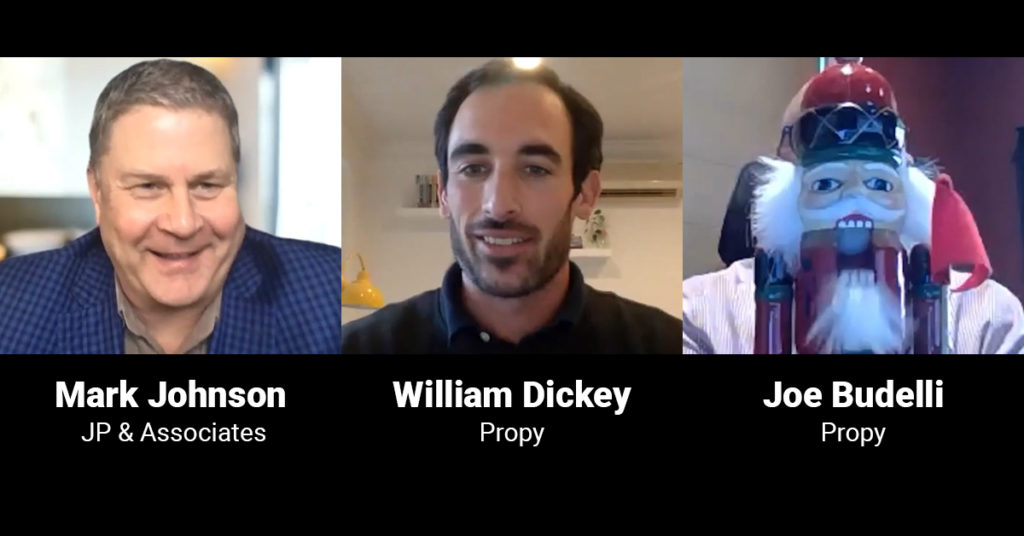Propy’s Weekly Webinar Episode #34 is with Mark Johnson, CEO at JPAR Real Estate

Mark Johnson, CEO at JPAR Real Estate along with Propy’s Chief Revenue Officer, Joe Budelli, and Tech advisor, William Dickey, discuss tips for agents to stay ahead of the curve in 2021, methods to attract and retain top agents, and traits that top agents share. Johnson also discusses the one key metric he uses that predicts the success of an agent.
A second career in real estate
Mark explains that he earned his Master’s degree, and was in the Army ROTC program, spending his active duty at several Army posts across the US. After his active duty was over, he spent a number of years in sales and marketing in consumer-packaged goods, and relocated to California during that time.
When that company was purchased, he had two choices—to stay in Southern California, or relocate back to Minneapolis. He chose to stay in California, and started in real estate as a second career. He was successful and nearly became Rookie of the Year.
Attracting and retaining top agents
Mark states that attracting and retaining agents is simple. It comes down to solving problems for a profit. We focus on solving our agents’ problems, and our agents solve the consumer’s problems.
One of the biggest challenges that real estate professionals face is hiring their first assistant, even though studies support that most agents will double their production when they hire an assistant. Agents get stuck on this, Mark says, because they get scared. They start thinking in terms of and the extra obligations they will have. It is overwhelming, and generally it’s because the agent has gotten stuck between the six inches between their ears. So, our solution at JPAR was to create the definitive guide to hiring an assistant, and it’s available in video and a step-by-step written guide, and that helps to solve this problem for agents. This becomes very attractive to agents, along with our CEO – Team Leader manual, which outlines the six steps every team lead needs to take to be successful.
When you become known as a problem solver, people naturally become attracted to you and want to be part of your solution. Our approach is to look at what challenges do we need to help our associates with, and what can we do to help our associates be able to do things faster, better, more efficient and with less stress.
The most difficult issues for team leaders
Mark explains that having a clear value proposition is one of the toughest things for teams to define. He knows he will have a successful team when they come to him and say they can deliver a better service to the consumer, or handle more leads more effectively as a team. For agents who are only thinking in terms of earning more commissions, Mark states they are not thinking this through deeply enough. It’s critical that you understand why you’re starting a team, and what the purpose of the team is, Mark emphasizes.
Another big mistake is not being clear on what the team member will pay in compensation and what they’re going to get from you in return. Mark explains that a common dispute that they have been team members and team leads, is the team member doesn’t feel they are getting any value for the split they pay, so turnover is high. When those team leaders come to me and ask why so many agents are leaving their team, Mark states that he always asks what is the value you’re providing to that agent. If there is no value, the agent will leave.
Mark explains that it’s not just financial incentives that agents are looking for, but over-all value. He shares that his top two teams have totally different approaches, but both are very successful. One team provides leads and has a great system in place for tracking those, holding the team accountable, and converting leads. Another team is very strong in coaching, mentoring, and training agents. Both of those models add tremendous value to their team members.
Mark states that you can’t take a one-size-fit-all approach. Each team has to find what their value proposition is, and that is unique to their goals, and what they want to accomplish.
Lead generation techniques
From a brokerage side, it’s very difficult to generate leads without paying for them, according to Mark. However, his agents have been having great success during the pandemic with virtual home walk-throughs. If they don’t have their own listing, they can do it for a local builder, or another JP associate who has a listing. That has been generating a very strong lead flow, and the only cost is their time to get it done.
Mark also states that they utilize Opcity through Realtor.com. Opcity scrubs the leads, so there are some upfront costs and referral fees associated with that.
Using surveys to provide value
Mark shares that JPAR is really big on getting feedback, and they use surveys to get a pulse on what agents and consumers are thinking. He said the key to using surveys is to really listen to what the results tell you. Doing this has made JPAR agent-centric, and in alignment with their agents.
Research shows you only need to ask four questions:
- What are we doing well?
- What could we do better?
- Would you recommend us?
- Anything else you want to tell us?
JPAR focuses on two values: Productivity and service. Mark explains that their philosophy is that agents will be attracted to and stay where they get more value than what the pay.
One area that many brokerages fail to provide value in is through training and mentoring. Mark states that JPAR has world class training and mentoring programs, and offer 100 different training classes every month. Classes cover the five stages of agent development, so whether you are a new agent, a growth agent, a team, or someone who is completely restructuring their career, there is a learning track available.
Having a competitive fee structure certainly adds value to a brokerage, however, Mark explains that in the surveys they give agents, the fees aren’t what is typically mentioned. Across the board, almost all agents mention training, mentoring, and the need for supportive leadership.
Mark says that at JPAR, they have very responsive broker support. When an agent needs to talk to a broker, they’ll received a call back quickly. Their average response time is an hour and 40 minutes, but sometimes the callback occurs within 15 minutes.
Specialize, and be wealthy
In a recent blog, Mark’s topic was “focus on the specialty.” He explains that what they consistently see is that when agents specialize, they are wealthy. Their most productive agents all have a niche, whether it’s first-time homebuyers, condos, or luxury. Agents with a specialty promote that directly to their target market, and are very clear on their marketing. All of our agents with a specialty are out-performing, in some cases as much as four times the average.
Mark explains that they do use some assessment tools and talking points to help guide agents to find their niche. Ultimately the agent needs to play the game for a year of two, and then some of the areas of interest develop naturally. Leadership at JPAR also recommends that agents look at their former career for possible niches; for example, if an agent was a prior first responder or teacher, there could be an area of specialty with people in those fields.
Building a collaborative culture
Mark shares the story that recently he had an agent reach out and say that she had called another agent for some help, and that agent spent two hours with her working through her issues. The agent who called him couldn’t believe how supportive and helpful people were in the brokerage.
“We’re close to our agents and have the most supportive culture that I’ve seen anywhere,”
says Mark. He explains that even though the agents are all competing against each other, there is no shortage of agents being willing to help and spend time with you, especially with new agents learning the business.
Mark feels that the start of any culture is about attracting and bringing in the right people. However, he has identified five traits that he feels is ultimately responsible for their culture.
They are:
- Done is better than perfect
- Redirecting after accepting a mistake
- Focused on the number of new appointments agents make in their calendar each week
- Having fun
- Growth mindset
Done is better than perfect
Psychologists studied 40,000 people that showed that perfectionism has increased by 33% since 1989. People seem to be internalizing the myth that life should be perfect, when in fact that’s an impossible outcome. The research shows that those who become preoccupied with perfection sets them up against unbelievable challenges.
Mark states that their approach is teaching agents to keep moving forward, keep testing, keep trying, make a mistake, and redirect after making it. He explains that redirecting means to recognize that a mistake happened, assess what happened and why, make it right, adjust your systems, be kind to yourself, and move on.
Changes during the pandemic
Mark states that they had a head-start over many companies because the brokerage was founded 100% paperless, so their agents didn’t have to rapidly adjust to a paperless environment. What they did have to adjust to was having a virtual open house, and learning to hold consults using Zoom. As a result, the company spent some time on training development and best practices for the agents.
He explains that they are seeing that virtual open houses boosted through Facebook and other social channels are getting more traffic than a physical open house and is generating more leads. Mark stresses that if agents haven’t mastered using virtual tours, virtual open houses, and drone photography, then they are already behind. If an agent wants to remain competitive, they must utilize these tools. If another agent presents to the listing that they provide both a virtual and physical open house, chances are they’ll get the listing over the agent only doing the physical open house. It will be a point of differentiation that today’s modern consumer is going to pick up on.
Mark believes that the pandemic has permanently changed the way we do business, and has shown a spot light on the inefficiencies in our models. He feels the result will be that brokerages will continue to find ways to innovate and become more efficient over the next several years.
Developing trust during the pandemic
“One of the things we get to do, is place a meaning and definition of anything you want,”
says Mark, “so you can place a meaning on Zoom calls saying it is hard to get to know people, or you can change it to say it’s the best way to get to know people. I choose to say this is one of the best ways to get acquainted.”
Mark continues by saying that a great system to use when you meet someone over Zoom, is to send that person a personal, handwritten note once a week for eight weeks. The fundamentals that we have used to build relationships haven’t changed, even though how we do it may have. If you can’t meet in person, find another way to make a personal, authentic contact with that prospect.
Mark shared a surprising study from NAR on another aspect of what develops trust between an agent and a client, and technology was at the heart of it.
Agents who do the following develop more trust with the consumer:
- Drone photography on all their listings, regardless of price point
- Virtual tours, or virtual walkthroughs
Mark continues by saying that the consumer expects more than most agents realize.
In a recent survey they did of 2000 consumers, they found that consumers classified agents in two ways:
- Door openers; those agents just looking for a commission
- Agents who added value
To continue to develop trust with consumers, agents need to use technology, and they need to become a valued, trusted advisor.
Top traits of a successful agent
Mark shares the traits he has observed over his career that spell success for an agent:
- PHD – not the degree, but “Poor, Hungry, and Driven”
- Must have a clear purpose and reason
- They’ve burned the boats, meaning there is no going back
- Discipline to execute on a day-to-day basis
- Focus on serving the consumer
- Actively scheduling appointments
- Know they’re making a difference in the community they serve
Mark asserts that he can quickly predict an agent’s success in real estate using just one metric, and that is how many appointments does the agent have scheduled in their calendar. He explains that the entire purpose of an agent’s marketing and everything they do is to gain a new appointment. If your marketing is not geared to generate a new appointment, then you need to update it.
Making a difference is important to many agents, and it’s common to find them involved with charitable organizations in their community. Mark stresses that the act of selling homes is making a difference, and shares a study conducted by NAR that indicated for every two homes that are sold, one job is sustained in the local market. He just told his agents that they had sustained 9,000 jobs in their communities! That is making a lot of difference.
Trends in real estate
Mark shared that he recently read the statistic that over the next 20 years, 21 million homes will be transferred from the Baby Boomers to the next generation:
- 1,000 people a day in the US are turning 65, and many will be downsizing
- Mortgage rates are being predicted to stay under 4% through 2023
- Mortgage forbearance is potentially ending in April, but statistics are indicating that won’t be an issue
- Commercial real estate will see some long-term changes
Up in Your Business
Mark has two books available on Amazon. His second book, Up in Your Business, is a collection of the best of his blogs from the past three years:







